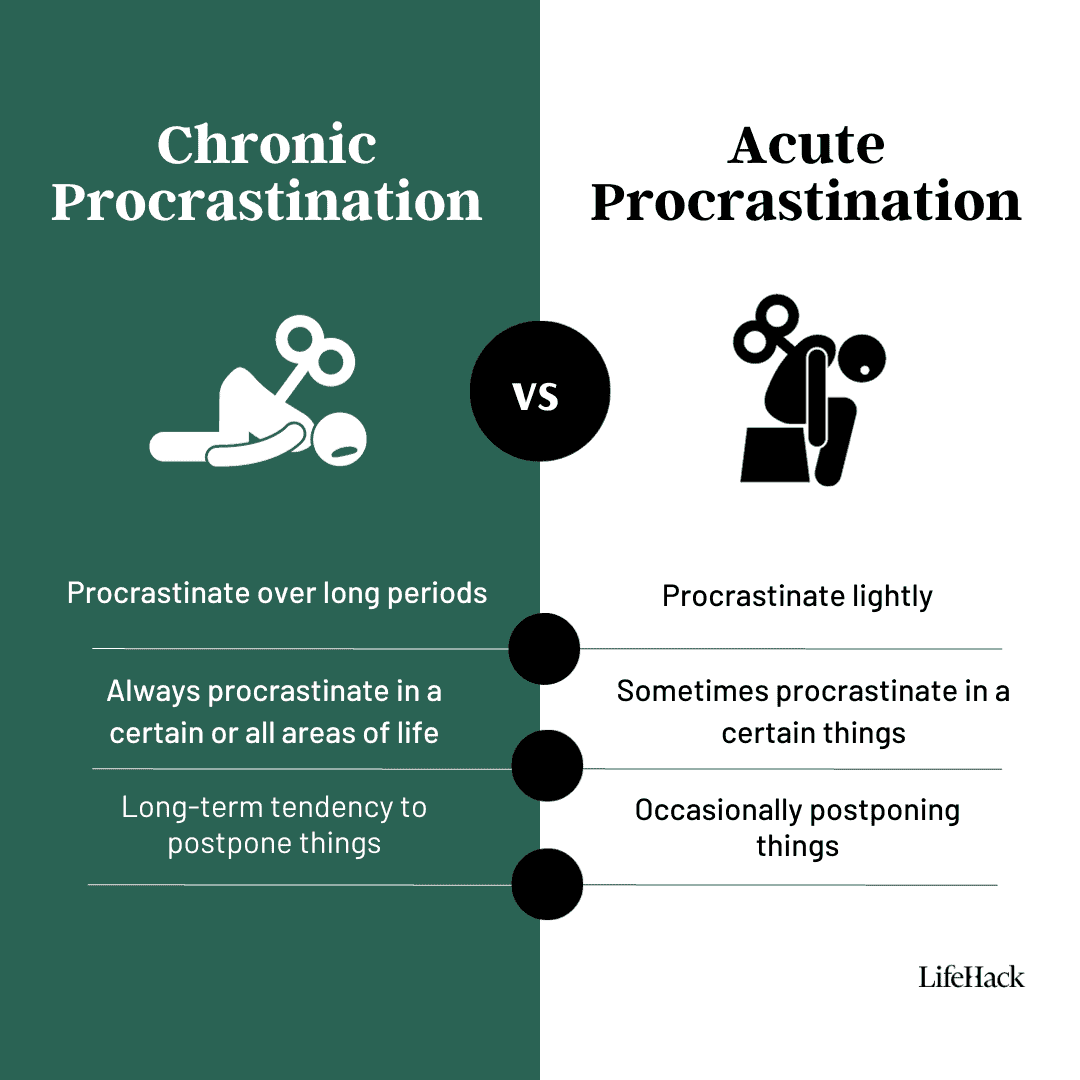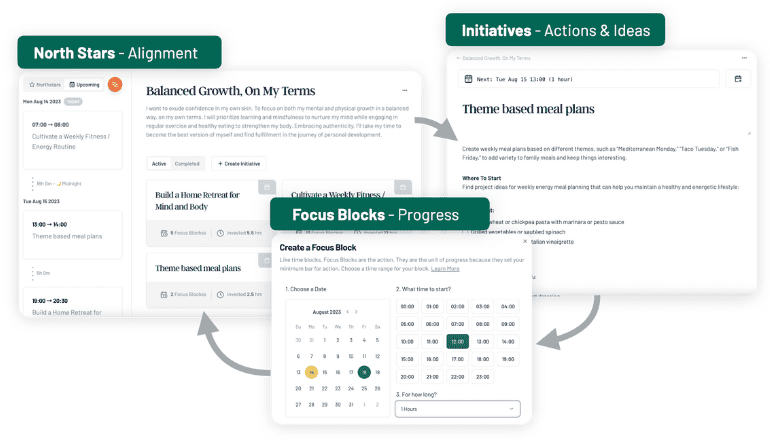[ad_1]
Power procrastination—it’s that nagging pull to delay duties, the decision of the snooze button you simply can’t ignore, the limitless deferring of what must be achieved. It’s not simply the occasional “I’ll do it tomorrow,” however a relentless sample that sweeps by way of your days, weeks, and even years.
For some, procrastination could be an every-now-and-then incident, for others, it’s an epidemic. Certainly, in response to the diligent analysis of Dr. Joseph Ferrari, a staggering 20% of people establish themselves as continual procrastinators. Think about that, one in each 5 individuals locked in a continuing tango with delay.
Why does this matter? As a result of we have to perceive that continual procrastination isn’t merely about laziness or poor time administration—it’s a critical challenge that may impede progress, hamper private development, and even take a toll on psychological well being. Understanding continual procrastination is like decoding a cryptic puzzle. Solely as soon as we dissect it, know it, can we then cope with it successfully.
Power Procrastination vs. Acute Procrastination
Procrastination isn’t only a one-size-fits-all affair; there are nuances to it. Power and acute procrastination are the 2 frequent sorts.
Power procrastination is a long-term behavior of pointless delay. Consider it because the uninvited visitor who strikes in and refuses to go away.
Then again, acute procrastination is like that occasional gatecrasher—it exhibits up, makes a large number, however leaves comparatively shortly.

When Severity Makes a Distinction
The depth of procrastination additionally counts. For example, if somebody procrastinates solely calmly—for a couple of minutes and on minor issues—their habits may not be seen as continual procrastination, even when it stretches over lengthy durations.
One Area or Many?
Some continual procrastinators have particular arenas the place they falter. They may at all times postpone home chores or at all times delay office duties. We will dub them as “continual educational procrastinators” or “continual office procrastinators”.
On the flip facet, there are those that procrastinate throughout a number of and even all areas of life, the “continual procrastinators” within the true sense.
The Lengthy-Time period Tendency of Delay
Power procrastination isn’t about how lengthy you delay a single activity. It’s concerning the long-term tendency to postpone issues, repeatedly.
A continual procrastinator may solely delay duties for a couple of hours or days at a time, but when this behavior stretches over years, it nonetheless counts as continual procrastination.
That mentioned, persistently suspending issues for lengthy durations additionally suits the invoice, because it showcases a long-term tendency to delay.
In each circumstances, the key phrase is ‘long-term.’ If it’s a recurring theme within the film of your life, it’s continual procrastination.
Recognizing Power Procrastination
So, how have you learnt in case you’re in its grasp? Are there indicators?
Sure, there are — they usually’re not as refined as you may suppose:
1. A Rocky Relationship with Deadlines
Power procrastinators usually wrestle with deadlines. They’re those making a mad sprint to complete a report within the eleventh hour, or handing in assignments with the ink nonetheless contemporary.
2. A Life-Vast Epidemic
Then there’s the breadth of procrastination. If you end up delaying not simply at work, however at dwelling, in your hobbies, and in your relationships, you’re not remoted incidents, however a continual challenge.
3. Frequent Procrastination
Frequency is one other indicator. Is procrastination your unwelcome day by day visitor, your fixed companion? If it’s a extra common a part of your life than your morning espresso, you could be a continual procrastinator.
4. The Lure of Distractions
Power procrastinators are sometimes simply distracted. When you can’t resist the siren name of social media when there’s work to be achieved, that’s an indication of continual procrastination.
5. The Ripple Impact: Relationships within the Steadiness
Procrastination could cause turbulence in your relationships. In case your family members are rising bored with your fixed ‘laters’, it’s time to take a tough take a look at your habits.
6. Filling Time with Trivial Duties
When you’re tackling your third load of laundry whereas your presentation stays untouched, you’re doubtless selecting straightforward over crucial.
Power procrastinators usually fill their time with trivial duties to keep away from the massive ones.
7. Your Well being Is Affected
The bodily influence can’t be ignored both. Misplaced sleep over that looming deadline, or stress consuming due to unfinished duties? Your physique is waving a pink flag.
8. Persisting within the Face of Unfavorable Penalties
Lastly, in case you’ve confronted unfavorable penalties—misplaced jobs, dinged credit score, pressured relationships—however nonetheless can’t appear to interrupt the procrastination cycle, you’re exhibiting a serious signal of continual procrastination.
However don’t despair. Recognition is step one towards progress.
Causes of Power Procrastination
There are 2 main causes of continual procrastination:
1. Feelings on the Wheel
Procrastination will not be at all times about laziness, neither is it purely a couple of lack of understanding. Most of the time, it’s deeply rooted in our emotional states.
Current analysis makes a compelling connection between our temper and the act of procrastination. It’s a wrestle between what we really feel and what we delay.
Merely put, we’re not suspending duties simply because they’re exhausting, however due to the emotional rollercoaster we affiliate with them.
Think about this: you’re a activity in your to-do checklist, and it immediately makes you consider the irritation and frustration it introduced you the final time. Or maybe, you’ve constructed it up in your thoughts to be this gargantuan, tough monster, even in case you’ve by no means tackled it earlier than. Both means, these emotions act as obstacles.
So, what do you do? You place the duty on the again burner, telling your self that tomorrow will probably be a greater day to confront these feelings. It’s about evading these preconceived concepts and dodging the emotional misery.
In essence, procrastination turns into your emotional defend, your go-to technique while you wish to sidestep these uneasy emotions. It’s a coping mechanism. As an alternative of dealing with the sentiments head-on, you keep away from the duty, hoping for a extra emotionally suited day. This strategy may give short-term reduction, however it’s a recipe for long-term stagnation.
2. The Deeper Root: A Psychological Well being Symptom
Typically, procrastination isn’t nearly dodging disagreeable emotions. It may be a symptom of deeper psychological well being points, like nervousness, melancholy, or ADHD.
Anxiousness: Concern’s Delaying Impact
For example, in case you’re coping with nervousness, your duties may look like steep mountains crammed with “what ifs” and worst-case eventualities. This concern can handcuff you within the current, delaying your climb.
Perfectionism’s Paralysis
There’s a sneaky connection between nervousness, perfectionism, and procrastination too, which is called perfectionist paralysis.
When you’re scared that you just gained’t be capable to do one thing completely, you may choose to not do it in any respect. You delay, hoping for a second of good readiness that by no means comes.
Despair: The Power Drain
With its behavior of gnawing away at your vitality and shallowness, melancholy will also be an enormous contributor to procrastination.
When motivation runs dry, duties are likely to pile up. You may delay duties, not as a result of they’re powerful, however since you doubt your skills to sort out them.
ADHD: A Focus-Pushed Detour
And let’s not overlook ADHD, which has inattention signs like distractibility, focus difficulties, and hyperfocus. These can all pave the best way to procrastination, making a labyrinth of delays.
The Cycle of Procrastination
These underlying points usually set off procrastination cycles that may solidify this habits in the long run.
Think about somebody who procrastinates resulting from nervousness. The delay results in poor efficiency, which fuels extra nervousness and units them up for extra procrastination sooner or later. It’s a vicious cycle, looping repeatedly, constructing a stronghold of continual procrastination.
Understanding that continual procrastination isn’t nearly time administration—it’s about managing your feelings, beliefs, and, in some circumstances, addressing underlying psychological well being points is necessary to breaking free from procrastination.
Tips on how to Deal With Power Procrastination
Tackling procrastination is a journey. And like most journeys, it’s simpler with a roadmap and maybe, a co-pilot. Listed below are two efficient routes that may steer you away from the land of everlasting tomorrows:
1. The Self-Assist Route
Wish to take a shot at breaking the cycle by yourself? Think about this: the web is crammed with sources, however not all are reduce from the identical fabric.
Apart from placing collectively this complete information which stands as a beacon for these misplaced within the maze of procrastination, my staff and I’ve additionally developed the Time Circulate System that can assist you get into actions simply and begin to get issues achieved.

It’s not nearly strategies; it’s about understanding the basis of your delays after which curating a personalised strategy to beat them.
Consider it as a toolkit; each device has its goal, and with a bit trial and error, you’ll discover what works greatest for you.
2. Search Steerage from a Therapist
If the load of continual procrastination feels too heavy to raise alone, it could be time to name within the specialists.
When you’ve been a serial postponeer and the ripples of delay are crashing into your work life, private relationships, or psychological well-being, it’s time to contemplate remedy.
A therapist does extra than simply hear. They’re educated that can assist you unearth emotional triggers, shining a lightweight on these darkish corners the place anxieties and fears reside. They’ll additionally spot any underlying psychological well being points that could be contributing to your procrastination behavior.
Extra than simply digging deep, remedy arms you with methods to counter unfavorable self-talk and reshape unproductive thought patterns. It’s about equipping you with the instruments and the perception to not simply break the cycle of delay, however to additionally guarantee it doesn’t re-establish its grip.
Whether or not you select the self-help path or lean on the experience of a therapist, know that progress is feasible. All you want is the need to start out.
Remaining Ideas
Power procrastination—this pervasive sample of delay isn’t nearly tomorrow’s to-do checklist. It’s a fancy net spun from emotional discomfort, unfavorable self-talk, and in some circumstances, underlying psychological well being points.
It influences not simply what we do, however who we’re—enjoying out in our jobs, {our relationships}, and our sense of self-worth.
Recognizing continual procrastination isn’t an indication of failure; it’s a lightbulb second. An invite to grasp higher, to dig deeper, and to usher in change. It issues since you matter. Your time, your potential, your peace of thoughts—they’re value preventing for.
[ad_2]